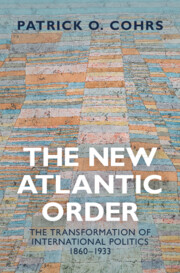Book contents
- The New Atlantic Order
- The New Atlantic Order
- Copyright page
- Dedication
- Contents
- Acknowledgements
- Abbreviations
- Maps
- Introduction
- Part I Inevitable Descent into the Abyss?
- Part II The Greatest War – and No Peace without Victory
- Part III Reorientations and Incipient Learning Processes
- Part IV No Pax Atlantica
- 14 An Impossible Peace?
- 15 Novel Superstructure of a New Atlantic Order?
- 16 No Just Peace without Security
- 17 The Eastern Frontiers – and Limits – of the New Order
- 18 A Formative Threat?
- 19 The Political and Moral Stakes of Reparations
- 20 The Imposed Peace
- 21 The Truncated Atlantic Peace Order of 1919
- Epilogue The Political Consequences of the Peace
- Bibliography
- Index
19 - The Political and Moral Stakes of Reparations
And Limited Advances towards a New Atlantic Economic Order
from Part IV - No Pax Atlantica
Published online by Cambridge University Press: 22 April 2022
- The New Atlantic Order
- The New Atlantic Order
- Copyright page
- Dedication
- Contents
- Acknowledgements
- Abbreviations
- Maps
- Introduction
- Part I Inevitable Descent into the Abyss?
- Part II The Greatest War – and No Peace without Victory
- Part III Reorientations and Incipient Learning Processes
- Part IV No Pax Atlantica
- 14 An Impossible Peace?
- 15 Novel Superstructure of a New Atlantic Order?
- 16 No Just Peace without Security
- 17 The Eastern Frontiers – and Limits – of the New Order
- 18 A Formative Threat?
- 19 The Political and Moral Stakes of Reparations
- 20 The Imposed Peace
- 21 The Truncated Atlantic Peace Order of 1919
- Epilogue The Political Consequences of the Peace
- Bibliography
- Index
Summary
Chapter 19 focuses on the political and moral stakes of one of the most contentious questions of the peace conference: on what grounds Germany was to pay reparations and how high the reparation claims of the victors were to be. It not only demonstrates how intricately the indemnity problem was linked with the fundamental question of who bore responsibility for the Great War and all the casualties and destruction it had caused, eventually leading to a clash between western claims of Germany’s “war guilt” and German efforts to refute them. Placing this problem in a transatlantic context, it also emphasises that the reparations conundrum was inseparable from the tectonic changes the war brought in the financial and economic spheres, especially America’s ascent to the status of the world’s pre-eminent economic and financial power and the massive indebtedness of Britain and France to the new “world creditor”. It thus casts fresh light on the question of why it proved impossible to negotiate a “rational” and mutually acceptable reparations settlement in 1919. And it reappraises why only limited advances towards a new financial and economic order and effective postwar reconstruction could be made. Finally, it highlights the far-reaching political consequences this had.
Keywords
- Type
- Chapter
- Information
- The New Atlantic OrderThe Transformation of International Politics, 1860–1933, pp. 788 - 808Publisher: Cambridge University PressPrint publication year: 2022



